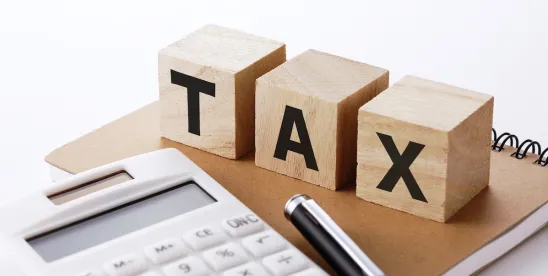The Senate Finance Committee has launched a new effort to consider the fate of dozens of temporary tax provisions (or “extenders”) that have expired in recent years, as well as other provisions slated to expire in 2019 and beyond. While the extension of these policies was a matter of course in the past, their future was called into doubt following passage of the landmark Tax Cuts and Jobs Act (“TCJA”) in 2017 — which some argue eliminated the need for more targeted, temporary tax incentives. The resulting uncertainty has vexed stakeholders across a range of industries, including advanced energy, healthcare, employment, and community development. A full list of affected industries and provisions appears at the end of this alert; they are also detailed in a new Joint Committee on Taxation report.
Recently, the Finance Committee announced the creation of six taskforces to consider the future of the extenders (as well as disaster-related tax provisions), and is soliciting feedback from stakeholders as part of the process. The list of taskforces is below; a detailed list of which taskforce each extender provision falls under can be found later in this alert.
- Employment and Community Development
- Health
- Energy
- Cost Recovery
- Individual, Excise & Other Expiring Policies
- Disaster Tax Relief
This is a crucial opportunity to inform the debate around these tax policies and to engage with Senate tax-writers and others to advance tax priorities. The K&L Gates tax policy team is actively engaged in the extenders debate and available to assist clients with pursuing strategic objectives.
The Tax Extenders' Season in Purgatory
Extenders were left without a clear path forward following passage of the TCJA. Since then, the committees of jurisdiction on both sides of Capitol Hill have largely volleyed back and forth about how to address the provisions, without producing much in the way of concrete action.
Under Republican leadership in the last Congress, the House Ways and Means Committee launched an effort to evaluate whether continuing certain extenders still made sense under the new regime established by the TCJA. The House Ways and Means Committee held a hearing on the various provisions but made no legislative progress towards reforming or extending the expired and expiring provisions.
Republicans on the Senate Finance Committee have generally been more supportive of continuing the extenders notwithstanding the TCJA. Earlier this year, Committee Chairman Chuck Grassley (R-IA) and Ranking Member Ron Wyden (D-OR) introduced the Tax Extender and Disaster Relief Act of 2019 (S. 617), legislation that would extend the tax extenders provisions that expired in 2017 and 2018 through December 31, 2019. Notably, Chairman Grassley and Ranking Member Wyden said they do not believe legislation to extend the expired tax extenders provisions needs to be paid for because they are an extension of existing tax policy.
The Democratic takeover of the House of Representatives at the start of this year appeared to set the stage for a bipartisan compromise, since House Democrats are generally seen as favorable to many of the extenders provisions. Indeed, one of the first subcommittee hearings out of the gate for the new Democratic majority on the House Ways and Means Committee focused on “Temporary Policy in the Internal Revenue Code.” However, the “PAYGO” rules passed by the House Democratic caucus present a potential complication. These rules require any legislation considered in the House that would increase government spending or reduce federal revenues to be offset by equal spending cuts or increases in revenue — potentially requiring costly offsets for the extenders provisions. Concerns regarding PAYGO, as well as the desire among some Committee Democrats to pair extension of business-oriented provisions with costly tax relief for middle-income individuals and families, have thus far stalled progress on tax extenders legislation.
Discussions regarding extenders continued recently in a meeting of Committee Democrats convened by Chairman Richard Neal (D-MA); draft legislation has reportedly started to circulate among Committee members as well. However, even after the meeting convened by Chairman Neal, members indicated that there continues to be debate over whether and how to pay for an extenders package. On the other side of the dais, House Ways and Means Committee Ranking Member Kevin Brady (R-TX) suggested that Republicans continue to remain skeptical of the post-TCJA value of certain extenders, saying he would not be inclined to support a package that does not include reforms.
Senate Finance Committee Seeks to Resurrect Extenders Process
Seeking to jumpstart discussions and break the House logjam on extenders described above, Chairman Grassley and Ranking Member Wyden have announced the creation of bipartisan taskforces to analyze the various tax extenders provisions that have expired or are expiring between December 31, 2017 and December 31, 2019.
The taskforces will focus on six different issue areas, including employment and community development; health taxes; energy; business cost recovery; a combined group consisting of individual, excise taxes and other temporary policies; and disaster tax relief. Chairman Grassley said that they are asking the taskforces to work with senators, stakeholders, and other interested parties “to consider the original purpose of the policy and whether the need for the provision continues today.” The taskforces are encouraged to consider potential solutions that would create long-term certainty, including phasing out, scaling back, reforming, eliminating, and/or short- or long-term extensions of certain provisions.
Chairman Grassley said that he sees this as a short-term, concentrated effort to make decisions on these provisions and is asking taskforces to report back by the end of June. In a floor speech making the announcement, Chairman Grassley also used the opportunity as a not-so-subtle nudge to the House that the ball is in their court and they need to do something with it. While this effort is being undertaken, Chairman Grassley said that he will continue to work with the House Ways and Means Committee on a path forward.
Information on the Six Taskforces:
Employment and Community Development
Contact: Employment&Development_Taskforce@finance.senate.gov
Senator Rob Portman (R-OH), Co-Lead; Senator Maria Cantwell (D-WA), Co-Lead
Senator Tim Scott (R-SC); Senator Benjamin Cardin (D-MD)
Senator James Lankford (R-OK); Senator Sherrod Brown (D-OH)
Senator Todd Young (R-IN); Senator Catherine Cortez Masto (D-NV)
Health
Contact: Health_Tax_Taskforce@finance.senate.gov
Senator Patrick Toomey (R-PA), Co-Lead; Senator Robert Casey, Jr. (D-PA), Co-Lead
Senator Michael Enzi (R-WY); Senator Mark Warner (D-VA)
Energy
Contact: Energy_Taskforce@finance.senate.gov
Senator John Thune (R-SD), Co-Lead; Senator Debbie Stabenow (D-MI), Co-Lead
Senator Pat Roberts (R-KS); Senator Thomas Carper (D-DE)
Senator John Cornyn (R-TX); Senator Sheldon Whitehouse (D-RI)
Senator Bill Cassidy (R-LA); Senator Maggie Hassan (D-NH)
Cost Recovery
Contact: Cost_Recovery_Taskforce@finance.senate.gov
Senator Mike Crapo (R-ID), Co-Lead; Senator Benjamin Cardin (D-MD), Co-Lead
Senator Todd Young (R-IN); Senator Catherine Cortez Masto (D-NV)
Individual, Excise & Other Expiring Policies
Contact: Individual&Excise&Other_Taskforce@finance.senate.gov
Senator Pat Roberts (R-KS), Co-Lead; Senator Robert Menendez (D-NJ), Co-Lead
Senator Steve Daines (R-MT); Senator Maggie Hassan (D-NH)
Disaster Tax Relief
Contact: Disaster_Relief_Taskforce@finance.senate.gov
Senator Richard Burr (R-NC), Co-Lead; Senator Michael Bennet (D-CO), Co-Lead
Senator Johnny Isakson (R-GA); Senator Maria Cantwell (D-WA)
A Prime Opportunity to Advance Tax Priorities
The taskforces evoke memories of the 2015 bipartisan Senate Committee on Finance tax reform working groups which resulted in recommendations on tax reform that helped to shape thinking as tax reform evolved until the passage of the TCJA. As with the working groups, the Committee is asking for stakeholder input, this time to consider the original purpose of the policies, whether they should be continued, and to identify possible long-term solutions that will end the year-to-year exercise and drama of trying to get them extended and figuring out if and how they will be paid for.
This is a prime opportunity for anyone interested in any extenders or disaster relief provisions to provide input. When efforts like this are undertaken by Members of Congress, it is critical that those impacted educate Members on the importance of these provisions and the potential economic impacts of eliminating or modifying them. Even if these efforts do not lead to immediate legislative action, the working group experience shows that they play a pivotal role in shaping developments that could occur years down the line. The Committee is seeking comments and input through the end of June 2019. Please contact any member of our tax policy team to discuss a strategy for weighing in on these policies and engaging with Congress to build support for your priorities.
Temporary Tax Provisions Under Consideration:
Employment and Community Development:
Indian employment tax credit (sec. 45A)
New markets tax credit (sec. 45D)
Mine rescue team training credit (sec. 45N)
Work opportunity tax credit (sec. 51)
Empowerment zone tax incentives (secs. 1391(d)(1)(A)(i) and (h)(2), 1394, 1396, 1397A, and 1397B)
American Samoa economic development credit (sec. 119 of Pub. L. No. 109-432, as amended)
Health Tax:
Credit for health insurance costs of eligible individuals (sec. 35)
Employer credit for paid family and medical leave (sec. 45S)
Medical expense deduction: 7.5 percent adjusted gross income (“AGI”) floor (sec. 213)
Black Lung Disability Trust Fund: increase in amount of excise tax on coal (sec. 4121)
Medical device excise tax (sec. 4191)
Specified health insurance policy fee (sec. 4375)
Self-insured health plan fee (sec. 4376)
Energy:
Credit for certain nonbusiness energy property (sec. 25C)
Alternative motor vehicle credit for qualified fuel cell motor vehicles (sec. 30B(b))
Credit for alternative fuel vehicle refueling property (sec. 30C)
Credit for two-wheeled plug-in electric vehicles (sec. 30D)
Second generation biofuel credit (formerly known as the “cellulosic biofuel producer credit”) (sec. 40(b)(6))
Incentives for biodiesel and renewable diesel (secs. 40A, 6426(c), and 6427(e))
Credit for electricity produced from certain renewable resources (secs. 45 and 48(a)(5))
Credit for production of Indian coal (sec. 45(e)(10))
Credit for construction of new energy efficient homes (sec. 45L)
Special depreciation allowance for second generation biofuel plant property (sec. 168(l))
Special rule for sales or dispositions to implement Federal Energy Regulatory Commission (“FERC”) or State electric restructuring policy (sec. 451(k))
Incentives for alternative fuel and alternative fuel mixtures (secs. 6426(d) and (e), and 6427(e))
Cost Recovery:
Credit for certain expenditures for maintaining railroad tracks (sec. 45G)
Three-year depreciation for race horses two years old or younger (sec. 168(e)(3)(A)(i))
Seven-year recovery period for motorsports entertainment complexes (sec. 168(e)(3)(C)(ii) and (i)(15))
Accelerated depreciation for business property on an Indian reservation (sec. 168(j))
Energy efficient commercial buildings deduction (sec. 179D)
Election to expense advanced mine safety equipment (sec. 179E)
Expensing of certain qualified film and television and live theatrical productions (sec. 181)
Individual, Excise Taxes, and Other Temporary Policies:
Discharge of indebtedness on principal residence excluded from gross income of individuals (sec. 108(a)(1)(E))
Premiums for mortgage insurance deductible as interest that is qualified residence interest (sec. 163(h)(3)(E))
Above-the-line deduction for qualified tuition and related expenses (sec. 222)
Look-through treatment of payments between related controlled foreign corporations under the foreign personal holding company rules (sec. 954(c)(6)(C))
Excise taxes on beer, wine, and distilled spirits
Oil Spill Liability Trust Fund financing rate (sec. 4611)
Disaster Tax Relief:
Special disaster-related rules for use of retirement funds (secs. 72(t), 165, 401-403, 408, 457, and 3405)
Employee retention credit for employers affected by qualified disasters (sec. 38)
Other disaster-related tax relief provisions






 />i
/>i
